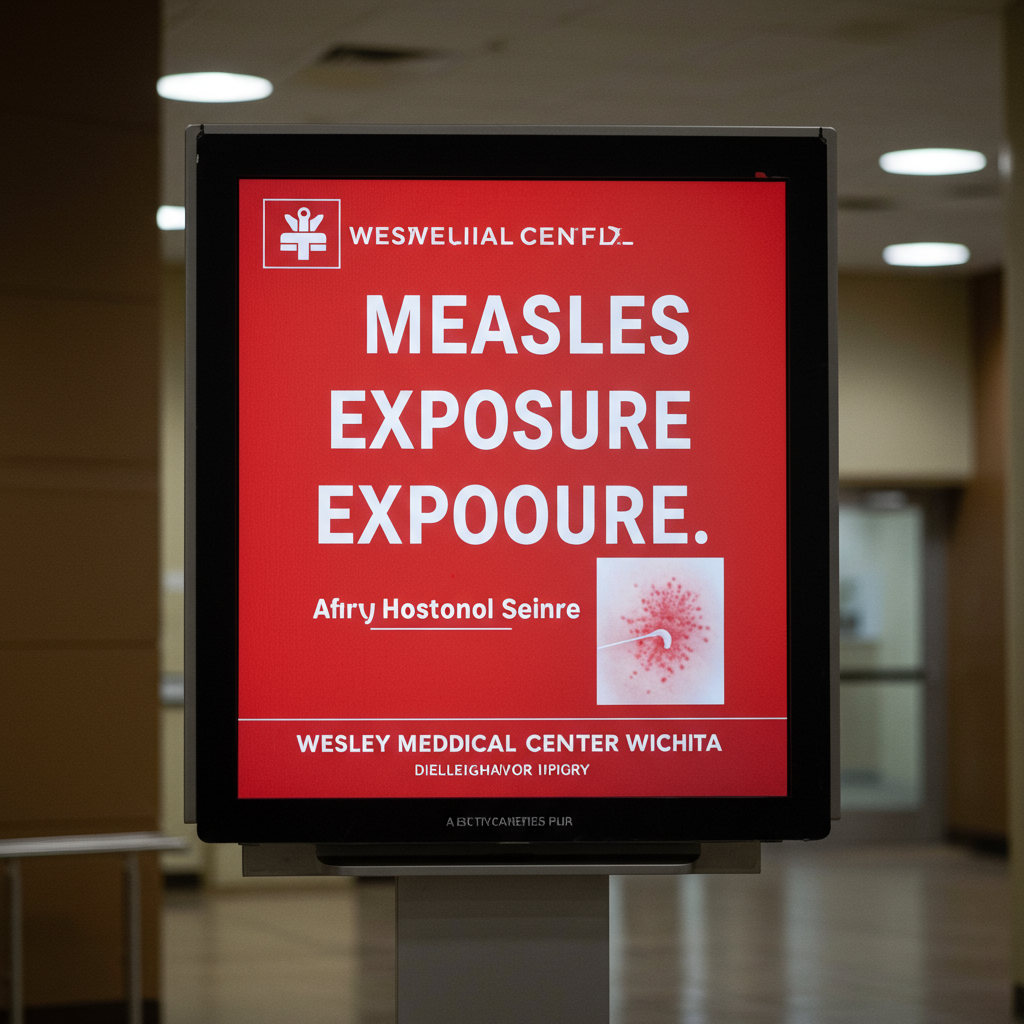An urgent public health alert has been issued by the Kansas Department of Health and Environment (KDHE) following a confirmed measles case linked to Wesley Medical Center in Wichita. Authorities are notifying individuals who may have been exposed at a specific location within the hospital during a defined timeframe. Measles is a highly contagious virus, making this alert critical for preventing further spread in the community.
This alert is focused exclusively on individuals who were present at the Fifth-Floor Pediatric Unit, located within Building 4 of Wesley Medical Center, at 550 N Hillside St, Wichita, KS 67214. The potential exposure window spans from Tuesday, July 1, 2025, at 10 p.m. through Thursday, July 3, 2025, at 4:45 p.m. It is crucial to understand that KDHE has explicitly stated there is no known risk of measles exposure outside of this specific unit, these dates, and these precise times. Individuals who were in other parts of the hospital during this period are not considered to have been exposed from this case.
Who Is At Risk for Measles?
Measles poses a significant risk primarily to those who lack immunity. This includes individuals who have not been vaccinated against measles or who have not previously had a confirmed measles infection.
People born before 1957 are generally considered to have natural immunity due to widespread exposure before vaccination programs began. If you have received two doses of the MMR (measles, mumps, and rubella) vaccine according to recommended schedules, your risk of infection is very low, though a small percentage can still contract the virus after exposure.
Accelerated MMR Vaccination Guidance for Infants
In response to the ongoing measles situation in Kansas, KDHE has aligned with CDC recommendations to offer accelerated vaccination for certain vulnerable populations. Specifically, babies aged 6 to 11 months old in Sedgwick County are now eligible to receive their first dose of the MMR vaccine earlier than the standard schedule.
This early dose provides some protection, but it is essential that these children still receive their regularly recommended doses later to ensure long-lasting immunity. Kansas is one of the first states to adopt this accelerated schedule during the current outbreak.
Steps to Take If Potentially Exposed
If you were a patient, staff member, or visitor on the Fifth-Floor Pediatric Unit in Building 4 at Wesley Medical Center between July 1, 2025, 10 p.m. and July 3, 2025, 4:45 p.m., KDHE and local health officials advise taking the following steps:
1. Assess Your Immunity Status
Determine if you are immune to measles. This means having documentation of two doses of a measles-containing vaccine (like MMR), laboratory evidence of immunity, or documented proof of a past measles infection diagnosed by a healthcare provider. If you are unsure of your vaccination history or immunity status, you should assume you are not immune.
2. Monitor for Measles Symptoms
Watch closely for signs and symptoms of measles for 21 days following your last potential exposure date. This 21-day period covers the typical incubation timeframe for the virus.
The monitoring period ends on specific dates depending on when you were in the unit:
If your last visit was July 1, 2025: Monitor through July 22, 2025.
If your last visit was July 2, 2025: Monitor through July 23, 2025.
If your last visit was July 3, 2025: Monitor through July 24, 2025.
Common measles symptoms include:
High fever, potentially spiking to over 104°F.
Persistent cough.
Runny nose.
Red, watery eyes (conjunctivitis).
Tiny white spots with bluish-white centers inside the mouth, known as Koplik spots, which often appear before the rash.
A characteristic blotchy red or reddish-brown rash that typically begins on the face, often along the hairline and behind the ears, and then spreads downwards over the rest of the body.
3. Avoid High-Risk Settings if Not Immune
If you are not immune to measles, consider staying home during the 21-day monitoring period to prevent potential spread, especially if symptoms develop. Avoid large gatherings and close contact with individuals who are vulnerable to severe measles infection. This includes unvaccinated people, infants too young to be vaccinated, pregnant women, and individuals with weakened immune systems.
4. Contact Your Healthcare Provider Immediately if Symptoms Develop
If you begin experiencing measles symptoms, call your healthcare provider or the Sedgwick County Health Department before visiting any clinic, urgent care, or hospital. Calling ahead is crucial so that healthcare staff can take necessary precautions to prevent the virus from spreading to others in waiting areas or treatment rooms. Do not just show up without calling first. Your provider can guide you on assessment, testing, and potential post-exposure treatment if you are not immune.
Understanding Measles Transmission
Measles is one of the most contagious infectious diseases known. It is a respiratory virus that spreads through the air when an infected person coughs, sneezes, or talks. Infectious droplets can remain in the air and on surfaces for up to two hours after an infected person leaves an area.
Unvaccinated individuals are highly susceptible upon exposure. The R0 (basic reproduction number) for measles is estimated to be between 12 and 18, meaning a single infected person can potentially infect 12 to 18 others in an unvaccinated population. This highlights the importance of high vaccination rates to achieve herd immunity and protect those who cannot be vaccinated.
Additional Resources and Contact Information
For questions about your health, immunity status, or concerns about potential exposure, contact your healthcare provider.
You can also reach out to public health authorities:
Sedgwick County Health Department: Call 316-660-7300.
- KDHE Epidemiology Hotline: Call 877-427-7317 or email epidem@kdhe.ks.gov.
- www.wibw.com
- salinapost.com
- kansaspublicradio.org
Additional information regarding measles, including details on the MMR vaccine, how to find vaccination records, and frequently asked questions, is available on the Kansas Department of Health and Environment Measles Resource Hub website. While internal links are not provided here, searching for “Kansas KDHE measles” will likely lead you to this resource.
Context of the Kansas Measles Outbreak
This exposure at Wesley Medical Center occurs within the context of an active measles outbreak affecting Kansas. As of the report date, KDHE had confirmed 83 cases across 11 counties in the state. This places Kansas among the states with the highest number of measles cases in the current national outbreak. The majority of cases have been reported in the southwest part of the state, but cases are occurring elsewhere, necessitating vigilance across all regions.
The accelerated vaccination guidance for infants in Sedgwick County is a direct response to the elevated risk posed by the current case numbers and the potential for spread.
Frequently Asked Questions
What specific location and time frame are included in the Wichita measles exposure alert?
The measles exposure alert is strictly limited to the Fifth-Floor Pediatric Unit in Building 4 at Wesley Medical Center (550 N Hillside St, Wichita, KS). The potential exposure window is from Tuesday, July 1, 2025, at 10 p.m. to Thursday, July 3, 2025, at 4:45 p.m. If you were in other parts of the hospital or outside these specific dates and times, this particular alert does not apply to you.
What steps should I take if I was at the specified location during the exposure window?
If you were on the Fifth-Floor Pediatric Unit at Wesley Medical Center between July 1 (10 p.m.) and July 3 (4:45 p.m.), 2025, you should first determine your measles immunity status. If you are not immune, monitor yourself for measles symptoms for 21 days from your last potential exposure date. Avoid high-risk settings if not immune. If symptoms like fever or rash develop, immediately call your healthcare provider or the Sedgwick County Health Department at 316-660-7300 before seeking medical care to prevent potential spread.
Who is most vulnerable to measles infection, and what are the vaccination recommendations?
Individuals who are not vaccinated against measles or lack documented immunity are most vulnerable. People born before 1957 or who have received two doses of the MMR vaccine are unlikely to get measles. In Sedgwick County, babies aged 6 to 11 months can now receive an early MMR dose due to the outbreak, though they will still need later doses per the standard schedule. If you are unsure of your immunity or unvaccinated, contact a healthcare provider or the Sedgwick County Health Department for guidance on vaccination or potential post-exposure measures.
Stay Informed and Vigilant
This measles exposure alert serves as a reminder of the importance of vaccination in protecting public health. Measles is a serious illness, particularly for infants and those with weakened immune systems. By following public health guidance, assessing your risk, monitoring for symptoms, and contacting healthcare providers as advised, individuals potentially exposed at Wesley Medical Center can help prevent further transmission. Stay informed through official channels like the KDHE and local health departments for the latest updates.




